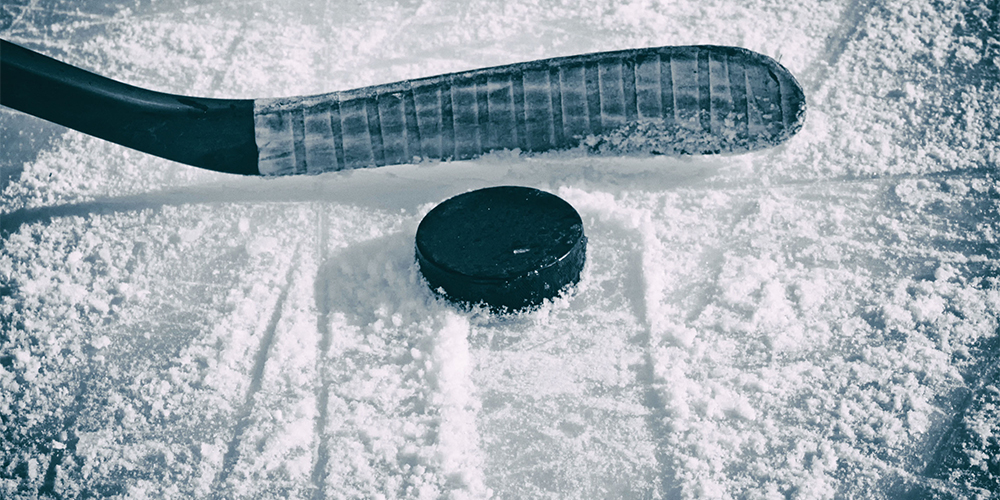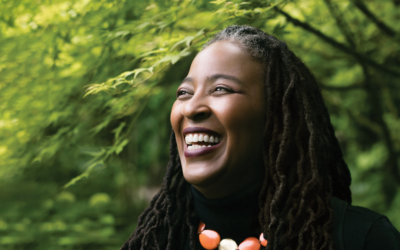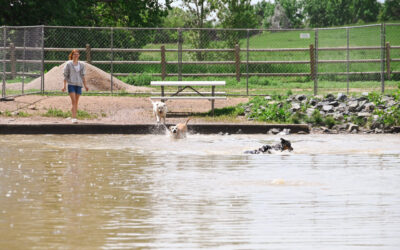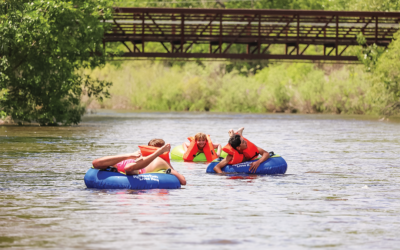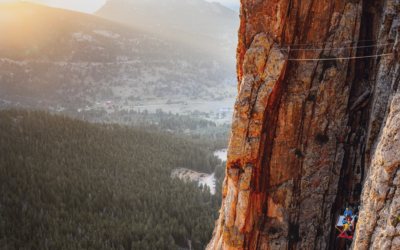By Dan England | Photos by Dan England
John Reid returned home to a loving, faithful wife, a happy 6-month-old and terrific odds that he would never have to face another bullet like the one that crippled his right arm. But
it wasn’t enough.
He loved the U.S. Marine Corps. He loved the brotherhood, the work and, if he’s being honest, the action. When he took a bullet on patrol and saw his elbow explode, the bullet did more than force doctors to rebuild the ragtag right arm (his dominant, of course) with six plates and 30 screws. It took away the only job he thought he could do. His life was over, he thought. He was 25.
He moped around for a couple years, and then, during a Marine Corps event, he saw people pushing themselves on ice using some sort of sled. They called it, simply enough, sled hockey. Reid grew up in Michigan, where residents drool at the word “hockey,” so that alone was enough to get his attention. But he also loved the way war vets much like himself pushed themselves across the ice with hockey sticks. It looked like fun.
“I really loved it,” Reid says. “I was joking around with the guys again. It was fun. But more than that, it was therapeutic. I felt like I was in the military again.”
He is now vice-president and coach of the Warrior Avs B sled hockey team, and he plays on the Avs’ A team.
True, Reid is able-bodied, other than the bad arm. He can walk, and the sport was designed for those who can’t use their legs, either because their spine is damaged, their legs are damaged, or they simply aren’t there. But it wasn’t cheating for him to play. If anything, he’d be better off skating instead of using that right arm of his, which hurts every day, to push him across the ice.
Now Reid wants to build an inclusive program in Greeley that would allow anyone to play. He also wants to help build Greeley’s adaptive sports offerings overall, but for now, sled hockey is his biggest goal. It’s a unique and ambitious goal. Even Fort Collins, a sizable city with an impressive lineup of adaptive sports much larger than Greeley’s, doesn’t have a program. And there are signs it’s working even though he’s only been at it for a few months.
“My goal is to really build it up,” he says. “There’s availability here but not like it should be.”
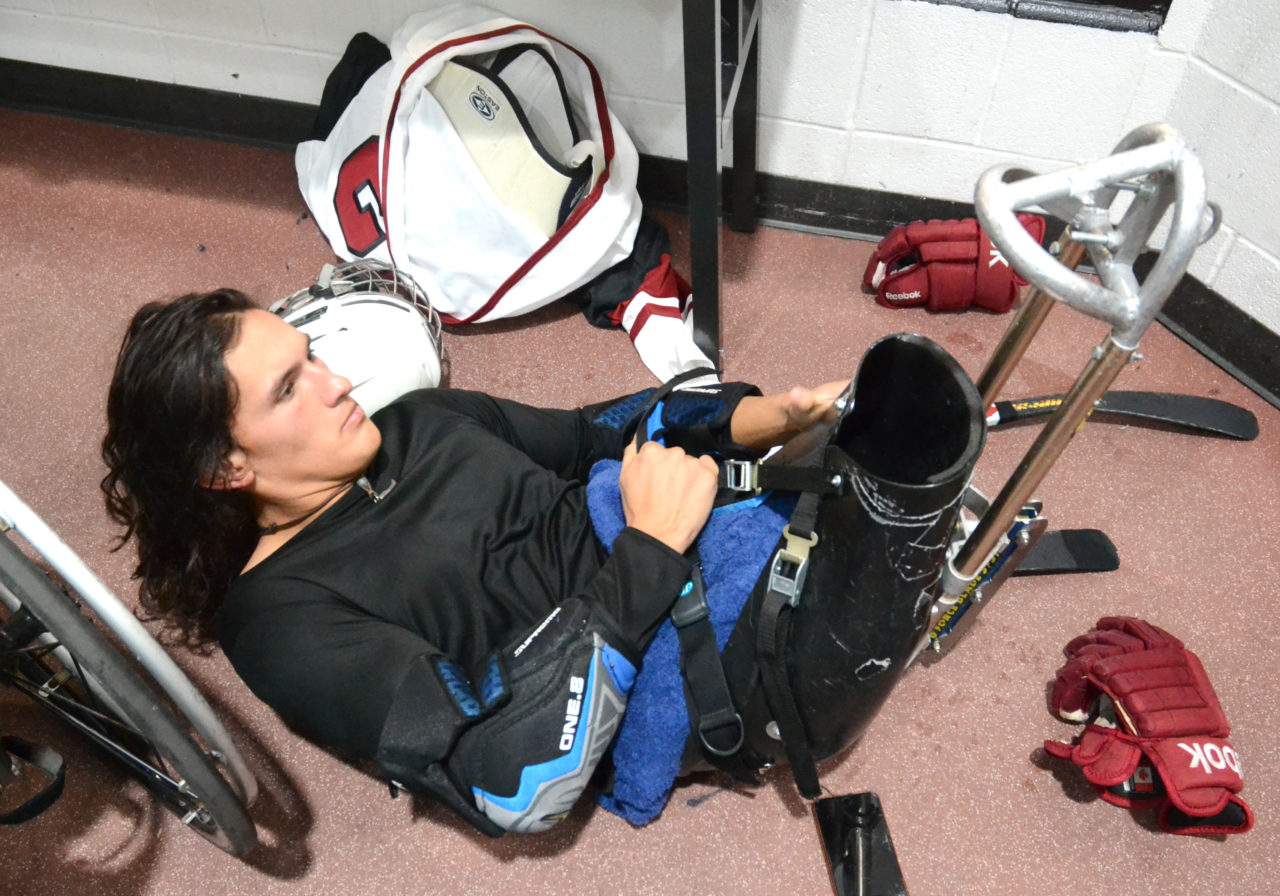
Miguel Jimenez, who was born without legs and plays for the Phoenix Coyotes’ sled hockey team, works to get wrapped around his sled.
Building a Team
Reid, now 33, began the path to his new life when his best friend, Josh Ayers, died of heart failure at age 30. He began to study physical education at the University of Northern Colorado to help others dodge that same fate. He graduated in May 2019 and teaches PE at Gilcrest Elementary. He loves to motivate the kids to move: Every time students work hard, he gives them a sticker with a design that calls to mind the WCW Wolfpack, his and Ayers’ favorite pro wrestlers. But promoting the sport of sled hockey is his passion.
The Avs play in the Pacific Coast League with a half-dozen others and associate with the Colorado Avalanche. Those teams played in a tournament in Greeley in mid-October and hosted a clinic at the Greeley Ice Haus with team president Jerry DeVaul. The clinic was really an extension of the open skates Reid hosts every Sunday afternoon to let anyone play.
Reid truly believes that if anyone, from kids to adults, would just give it a try, he and DeVaul, who offers some guidance, will eventually get enough people to host regular games and maybe even a league.
“Once you start to play,” says Reid, “you get hooked because it’s so different.”
Sled hockey may be different, but the sport is exactly as it sounds: Yes, it really is hockey on a sled. Players push themselves on the ice with their sticks. The really good ones can fly around the ice like a guided torpedo. Sure, it’s really fun, whether you can use your legs or not, but you also have to stay balanced on the sled, push yourself across the ice with both sticks and, oh yeah, hit the puck, pass it and maybe even shoot it into the corner of the net without losing that balance or getting checked into the boards by an opposing player.
What, checking doesn’t seem fair when you’ve got all those other things to worry about? Hey, we said this was hockey. The same rules apply.
“It’s a very humbling sport,” Reid says. “You have to be proficient with both your left and your right hand. It’s just like learning how to walk all over again.”
But that kind of physical challenge in a sport is exactly what players such as Joshua Swope, 31, want. “I like bashing people,” Swope says with a grin. “My brother and I like to call it demolition derby on ice.”
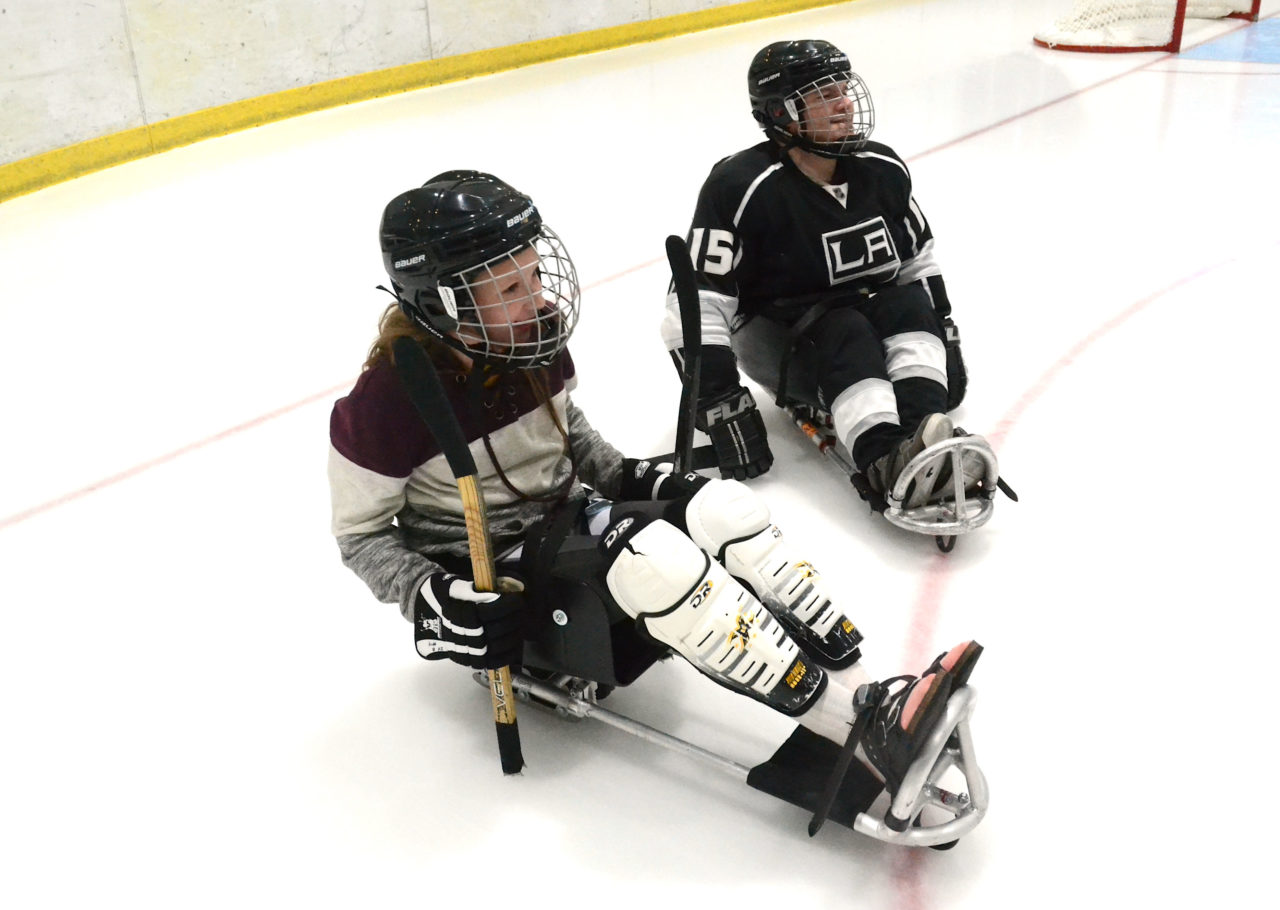
A young participant of the sled hockey clinic in October at the Greeley Ice Haus squeals with delight with Joshua Swope of the LA Kings’ sled hockey team. The clinic encouraged able-bodied people, mostly kids, to play the sport along with those with physical disabilities.
Swope has spina bifida and therefore, no use of his legs, so there aren’t many chances for him to bash away unless he’s on the ice. He’s good enough now to play on the LA Kings’ sled hockey team, and he visited Greeley to help with Reid’s clinic. He refrained from bashing the kids trying out the sleds for the first time.
The sport is coed and allows those with mental and intellectual disabilities to play as well as those with physical challenges and, of course, the able-bodied. Those with disabilities don’t mind playing with the able-bodied because they want to see the sport grow and, really, there’s no advantage for the able-bodied once they’re strapped down in a sled.
“We are all struggling with numbers,” says Miguel Jimenez, who plays for the Phoenix Coyotes’ sled hockey team. He is 19 and was born without legs. “I want as many people to play as possible.”
If anything, the able-bodied have a disadvantage because most haven’t spent the time out on the ice that Jimenez has, and it shows as he skates figure eights around everyone else, even the more experienced players.
“Sports have been a big part of my life,” Jimenez says, “and just having something else to play is wonderful.”
Reid has no doubt that he and DeVaul will build a program. They have a half-dozen sleds with the Greeley Ice Haus thanks to a grant, and he believes he can get others. He can get the numbers.
“A lot of people told us we couldn’t get as far as we have,” Reid says. “The city is really helping us.”
The city is helping because officials in Greeley believe in the program. “This is, honestly, one of the coolest things I’ve ever been involved in,” says Mark Mann, manager of the Greeley Ice Haus.
Katelynn Johnson, who’s worked full-time at the City of Greeley since December 2018 to build a new adaptive recreation program, is a fan of the sled hockey program as well.
“It is awesome,” Johnson says. “We would love to grow it. I think if we can get more drop-ins on Sundays, it would be successful.”
Reid’s life also feels successful now. He’s still married to Samantha, and now has two kids, aged 7 and 3. He’s extremely happy once again. He has a purpose. And, on most days, that’s enough.
But not all days. “If I’m having a rough day,” Reid grins, “I’ll look at her and say, ‘I need to get on the ice.’”
If you want to try sled hockey, the sport is open to anyone to try for free (even if you’re able-bodied). You can drop in from 1:45 to 2:45 p.m. on Sundays at the Greeley Ice Haus in downtown Greeley.
There are lists of offerings for those with special needs, physical, mental or intellectual, but if you don’t see what you’re looking for, call your city and ask about it. They may be able to find something to make it work. Most cities, including Fort Collins and Greeley, have lists
of adaptive activities
they offer.
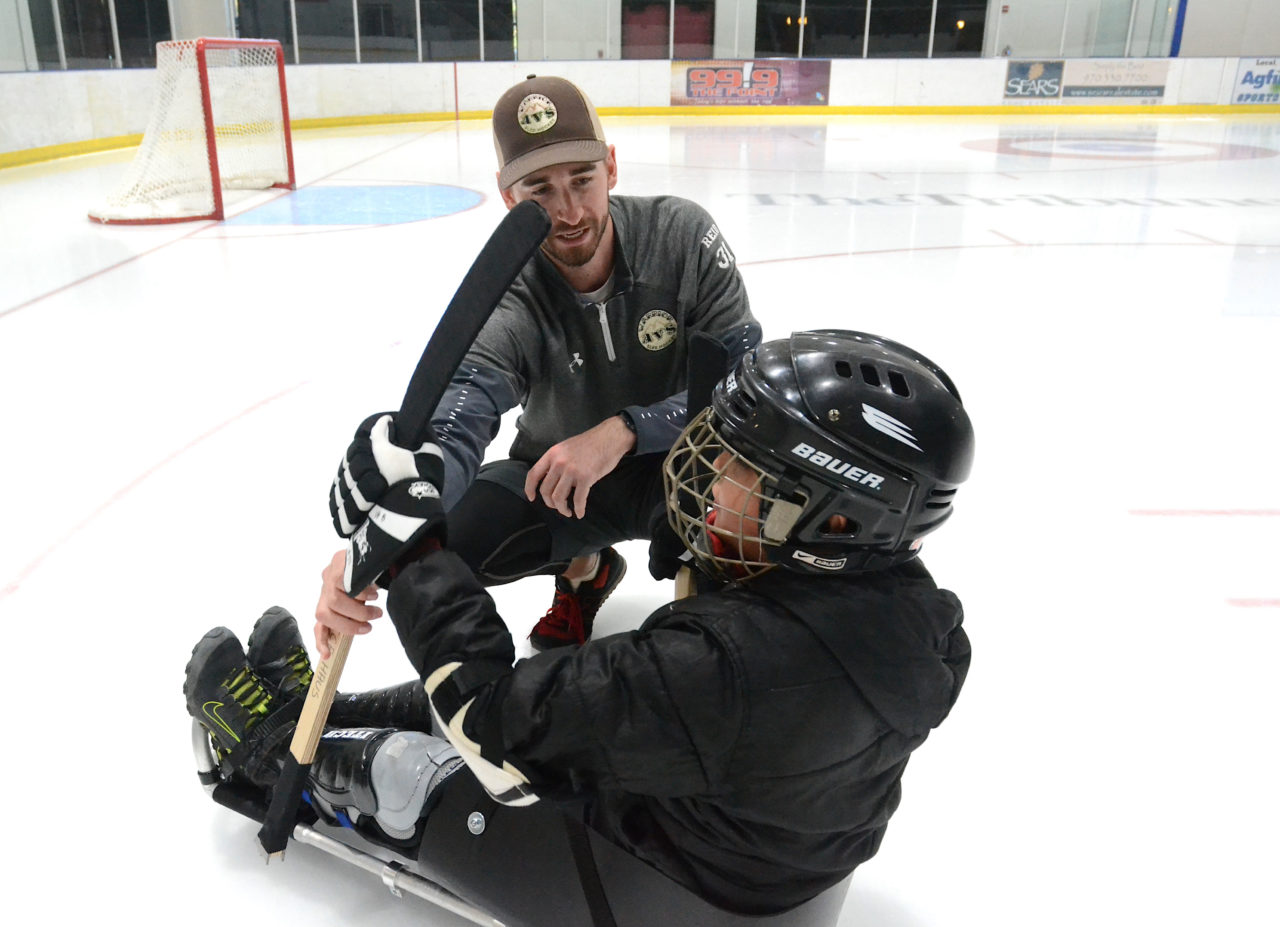
John Reid prepares another kid to head out on the ice to play sled hockey for the first time. Reid is attempting to build a sled hockey team in Greeley with the city’s help. The program gave Reid a purpose after he was shot on a tour of duty for the U.S. Marine Corps.
Inclusive Sports in NOCO
When cities offer adaptive programming, they try to keep something in mind: Just because their clients are limited doesn’t mean their activities have to be as well.
“They can sign up for any sport,” says Johnson. “We can support them no matter what. We will work with anyone.”
That’s trickier than it sounds, even as Greeley pushes to catch up to many other larger cities in Colorado and build a strong adaptive recreation program. She’s open to suggestions that serve either those with intellectual or physical disabilities, or both, such as a kickball tournament she hosted, and she believes she could get anything going if participants are willing to wait up to six months.
Johnson has offered bingo, swimming and yoga to some limited success, and has tried many other sports. She doesn’t want to rely on crafts, calling them a “crutch” in the adaptive world because many day programs lean on them a bit too hard already. She has her own dreams, too, such as offering hiking or rock climbing in Rocky Mountain National Park. If someone signs up for a sport who has restrictions, such as the need for a chair, she will do her best to make it work for that person.
“[Before], we didn’t have what we should have,” Johnson says. “But now we are doing a lot with what we have.”
Johnson, of course, would like to do more, but her annual budget of less than $100,000 limits her, she admits. She is the department, stretching her degree in therapeutic recreation to patrol some activities by herself, and hoping for volunteers or support from seasonal employees or staff to help groups requesting the activity.
Getting enough staff members and finding the equipment to make a sport work are always issues, but those are good problems to have, Johnson says, and ones that can be solved because it means people are participating. She’s already had to shut down many sports because participation was too low. She really doesn’t have a sport going for those with physical disabilities other than sled hockey, which she takes pride in because Greeley can offer it even when larger cities don’t have it.
“We’ve had a consistent dance group going for two months,” Johnson adds, “but before that, really the only time we’d have people is when we put on a special event.”
Indeed, simply letting people know the programs exist, or there exists the opportunity to create more, remains the toughest problem. Johnson works hard marketing her programs, and yet it never seems as if it’s enough. This is a big issue even in cities with a variety of programs and people to do them, such as Fort Collins.
“We do outreach all the time,” says Renee Lee, therapeutic recreation supervisor for the City of Fort Collins. “Word-of-mouth is our biggest way to get people there.”
Lee says Fort Collins did a survey of people to decide what to offer. She brings in Paralympic athletes who live in Fort Collins and has a successful wheelchair rugby team, with wheelchairs refurbished into rugby-ready equipment. She has teams for softball and basketball for both those with intellectual and physical disabilities. She offers skiing through Winter Park’s famed adaptive programs. Other cities learn how to get creative: Loveland offers a swim night for those with sensory challenges.
“Different groups do need different programming,” Lee says. “One thing we have in Colorado is really strong networking. Not everyone wants to play wheelchair sports, so you want to pull from a whole region and hold clinics in each other’s communities.”
That helps her and Johnson find a sport for those who request it or find a way to make a sport work. People are used to traveling to find a sports team that caters to those with limitations, and Northern Colorado cities will continue to work to find a place for those people to go.
“There’s always a way to figure it out,” Lee says.

